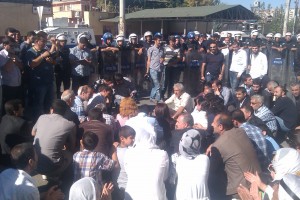(geschreven voor Engelstalige site, geen tijd om te vertalen, sorry!)
Kurdish prisoners’ hunger strike grips Turkey as their health conditions deteriorate.
Hundreds of mostly Kurdish prisoners are nearing the 50th day of what they call an “indefinite and irreversible hunger strike,” launched to draw attention to political demands.
About 680 prisoners in 58 prisons across the country have joined the strike since it started September 12th, according to media reports. More prisoners appear to be entering the strike every week, but limitations on access to the facilities make it impossible to verify figures.
Most of the hunger strikers are incarcerated for PKK membership or charges stemming from pro-Kurdish political activities. They have focused on two demands: imprisoned PKK leader Abdullah Ocalan must be allowed to meet with his lawyers, and obstacles to education and conducting legal defenses in Kurdish during court proceedings must be addressed.
In remarks to the press after meeting with hunger strikers at Ankara’s Sincan Prison Wednesday (October 24th), Justice Minister Sadullah Ergin said the strikers’ “voice[s] have been heard” and that the government is taking steps to address their demands.”We say intensive efforts are under way [to create] a Turkey where there will be no need for [such actions],” Ergin said. “Our ministry’s work regarding the right of [legal] defenses in native languages is continuing. We’ll conduct the necessary notifications after our work in the other areas matures.”
Ergin said the government is working to prevent negative health repercussions from the hunger strike.
“Their health and bodily integrity are the state’s responsibility. All diligence is being shown for them,” he said. “We won’t allow even one person in prison to suffer so much as a bloody nose. We’ve mobilised all our resources to prevent such an outcome.”
It’s unclear how the strikes will develop, considering political conditions in the country and the nature of the strikers’ demands. Violence between the PKK and the army has increased, talks between the state and the PKK have been cut off, and Ocalan has not met with his lawyers since July 2011.
Meanwhile, human rights groups and the strikers’ supporters are warning that the prisoners’ health is deteriorating as tension around the issue rises, with sit-ins, marches and press statements to support the hunger strikers being organised in cities across the country.
At a sit-in protest in front of a Diyarbakir prison to support the hunger strikers, Aysel Tugluk, an independent deputy representing Van, told SES Türkiye the Kurdish political movement expects the prisoners’ demands to be met. ”If the government wants peace, these demands can be met within a week,” said Tugluk, who is close to the pro-Kurdish BDP.
“We don’t formulate our demands based on what the government might be ready to give us. We just have our rightful demands [and] they will have to be met,” Tugluk said in response to criticism that the strikers’ demands are unrealistic within the time frame of a hunger strike.
Muhterrem Suren, a lawyer at the Diyarbakir office of the Human Rights Association (IHD), told SES Türkiye his organization supports the strikers’ demands even though they oppose hunger strikes as a tactic. ”The demands are just and need to be met to solve the Kurdish issue,” he said.
Suren said IHD will hold the government responsible if any of the strikers die. ”It’s [the government's] task to protect the life of their citizens, including prisoners. Yes, people choose to join the hunger strike, people choose to go to the mountains [to join the PKK], but it is the government that’s not making enough effort to solve this issue,” Suren said.
Musehher Ulker, 45, who participated in the sit-in at Diyarbakir prison, was herself recently imprisoned for five months. ”I wish I was still inside so I could join the hunger strike,” she told SES Türkiye. “Why? I can’t explain, you have to be inside there to know what it’s like. I have seen mothers in there, in pain, cut off from their children, even though they did nothing to deserve a prison sentence.”
Sirri Dogan, who heads the Diyarbakir branch of TUHAD-DER, an organisation that supports people with relatives in prison, told SES Türkiye that hunger strikers’ families are getting desperate. ”They can’t visit their loved ones in prison, they don’t know about their health situations, they often don’t even know for sure if they’ve joined the hunger strike, and to what extent their lives [may be] in danger,” Dogan said.
Semsettin Yilmaz, whose daughter Pelin joined the hunger strike from an Izmir prison, is among the families of prisoners keeping vigil in a tent behind Van’s city hall. He said he hasn’t seen his daughter, who is serving a six-year term for a “terror-related crime,” in six months.
According to Yilmaz, authorities have denied him the chance to visit Pelin. The hunger strikers also don’t want to receive their lawyers or visitors, as walking to the meeting room from their cell consumes too much of their limited energy. As his daughter’s condition deteriorates, he’s pondering what to do next.
“For now, we’re not joining the hunger strike. But we’re considering it,” Yilmaz said.



Recente reacties